Super Bowl 2023: Race, rap and the Arizona Super Bowl that never was
- Published

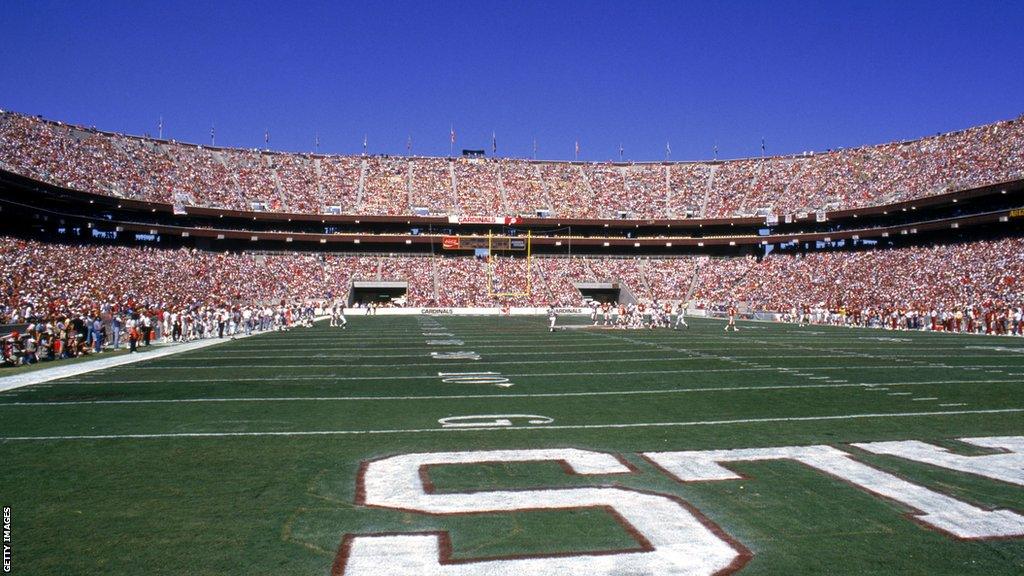
Sun Devil Stadium was awarded a Super Bowl in 1990. A year later, the NFL changed its mind and switched venues
Arizona is now an established Super Bowl host. But it hasn't always been like that.
On Sunday, state capital Phoenix will host the NFL's championship game as the Kansas City Chiefs take on the Philadelphia Eagles. It will be the fourth time the season showpiece has come to the city.
But in the 1990s Arizona, tucked in the south-west of the United States, was an American football outpost.
So what better way to put the state on the map than staging one of the world's biggest sporting and cultural events?
"I feel as though I've won the lottery," said Governor Rose Mofford in March 1990 as Arizona earned the right to host the 1993 Super Bowl.
"This is one Super Bowl that nobody will ever forget."
However, the NFL had underestimated something. Within the state, a debate was brewing to the boil.
Politicians and celebrities had picked sides. Hip-hop superstars Public Enemy would release a song about it.
And finally it engulfed the biggest sports event in the state's history - the 'Super Bowl that nobody would forget' instead became the Super Bowl that never happened.

Arizona had only one professional sports team until the Cardinals NFL franchise, owned by the Bidwill family since 1933, moved from St Louis to Phoenix in 1988.
Initially they played at a 70,000-capacity college stadium, which was only supposed to be a temporary home. It was hoped their support would grow to fill it. The opposite happened.
In the Cardinals' first season in Arizona, they attracted an average crowd of 59,000. In the second, it dropped to 43,000 as a losing record got worse.
Until then, the Super Bowl had most often been staged in Los Angeles, Miami or New Orleans, but the NFL had begun to expand its brand by taking its showcase event to other cities.
So to help Cardinals owner Bill Bidwill boost his flagging franchise, the NFL handed Phoenix the 1993 Super Bowl.
"The Super Bowl's a big deal, it's a monumental cultural event," Dr Todd Boyd, professor of cinema and media studies at the University of Southern California, told BBC Sport.
"A lot of people host parties around it, everybody's watching - certainly back then as people didn't have as many things to watch.
"American football is the most popular sport in the country and the Super Bowl's an unofficial national holiday."
In Arizona, though, it was in conflict with another national holiday.
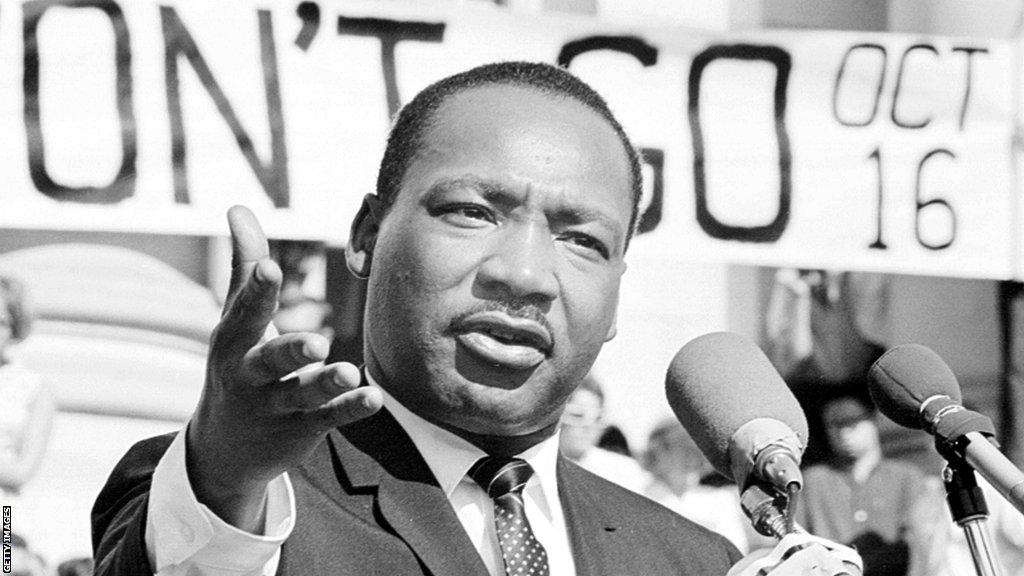
Civil rights activist Martin Luther King was assassinated in 1968. James Earl Ray was convicted of his death after being captured at Heathrow Airport
In 1983, President Reagan had signed into law a national holiday honouring Martin Luther King Jr, the pioneering black civil rights leader shot dead in 1968, on the third Monday of January.
It took several years before those in Arizona could enjoy it.
The Republican state legislature blocked several attempts to make it a paid state holiday.
It was only in 1986 that Governor Bruce Babbitt - a Democrat - forced Martin Luther King Jr Day on to Arizona calendars by executive order.
Babbitt made the announcement from the pulpit at the First Institutional Baptist Church in Phoenix, where Dr Warren Stewart is the senior pastor.
"In his speech here, he said 'you're going to have to fight for it', which was really prophetic," Dr Stewart told BBC Sport.
While running for election as Babbitt's successor, Evan Mecham made a campaign promise to rescind Babbitt's order. Days after taking office in 1987, he kept it.
"King doesn't deserve a holiday," said Mecham. "You folks don't need another holiday. What you folks need are jobs."
Supporters of the outspoken Republican insist he believed that economics was the key to improving the lives of black people in his state, but his comments on social issues made him a polarising figure.
Dr Stewart knew where he stood.
The pastor, who moved to Arizona from Kansas in 1977 via New York, formed a multi-faith, multi-race coalition to try to get Mecham or the state to pass a holiday.
"We were angry, he disrespected the legacy of Martin Luther King," said Dr Stewart.
Dr Boyd added: "It's one thing to oppose it; it's another to repeal it once it's already been put in place.
"There was no shame in Evan Mecham's game. He was comfortable openly flaunting his ignorance and bigotry.
"In a lot of ways he sounded like a holdover from the type of characters you would have encountered in the 1960s - unapologetically bigoted, especially racist, and kind of a relic."
Mecham was removed from office in 1988 after being convicted in an impeachment trial of obstruction of justice and misuse of government funds.
But his abrupt departure from power did not ensure the immediate return of the Martin Luther King holiday.
Governor Mofford - Mecham's successor - supported its reinstatement. The Republican state legislature still opposed it. Deadlock.
In November 1990, Dr Stewart's coalition collected enough signatures to force a tiebreaker - a vote by the people of Arizona themselves.
With Phoenix having now been awarded the Super Bowl, they went to the polls knowing the NFL was watching.
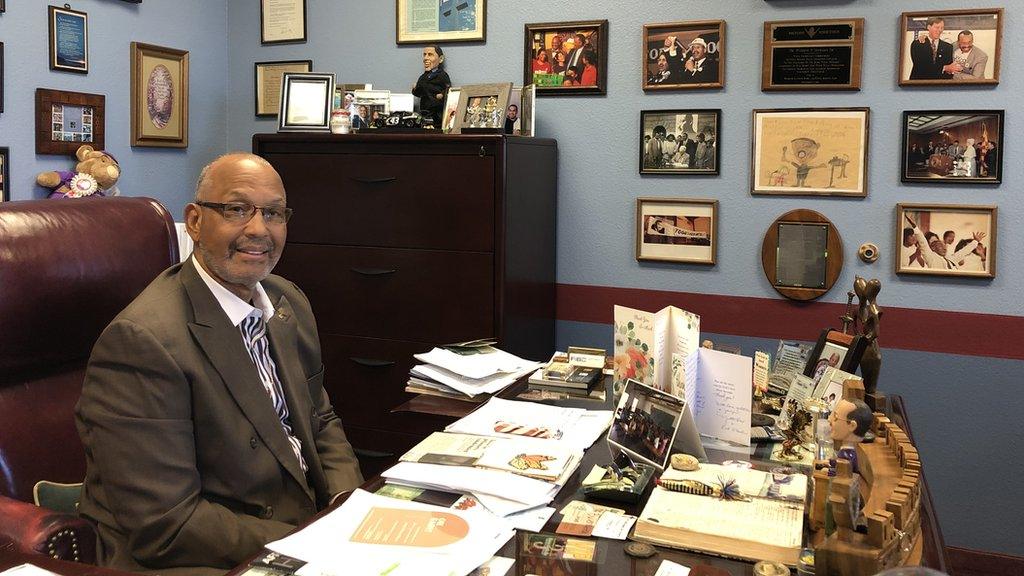
Dr Warren Stewart is the senior pastor at the First Institutional Baptist Church in Phoenix
At the time, the percentage of black people in Arizona was about 4%, way below the US national percentage of 12%.
Dr Stewart says he was not totally in favour of a people's vote "because so many people didn't understand the holiday". He would have preferred the state legislature to act.
"That's their job," he said. "When we started the coalition, I sent letters to all the white business leaders, the executives, to help us fight this and they ignored them. They wouldn't pay attention to us.
"But when the NFL started suggesting they wouldn't bring the Super Bowl here, that's when the business community began to call me, to lead the fight towards the 1990 referendum.
"I kind of backed away because I knew they didn't want it for the right reason. They just wanted a football game. I didn't feel comfortable working with them."
NFL commissioner Paul Tagliabue said the league was "trying to act in a fair-minded and responsible way", that they didn't want to do "anything punitive".
But as the people of Arizona took to the polls, the consequences were clear: a no vote would mean no Super Bowl.
There was also some confusion as the ballot paper featured two propositions regarding a Martin Luther King holiday, which diluted the yes vote.
Nevertheless, 51% voted against it.
"All heck broke loose, the bad publicity," said Dr Stewart. "We became the only state in the nation to vote on the holiday and we defeated two different versions.
"It was terrible. The defeat caused the business leaders, the state, to be in a deep funk. It was like 'how could that happen?'"
Five months later, in March 1991, the inevitable happened. The NFL confirmed it was moving Super Bowl 27 to Los Angeles.
Arizona began to suffer the consequences. Hosting the Super Bowl would have brought more than $200m into the state.
Stevie Wonder, who promoted the campaign for a national holiday to recognise Martin Luther King's birthday by releasing Happy Birthday in 1981, led a boycott of music events and conventions in Arizona, piling on the financial pain of the state's decision.
There was the reputational hit too. Public Enemy summed up the mood of outsiders when they released their fourth studio album in 1991, which featured By The Time I Get To Arizona.
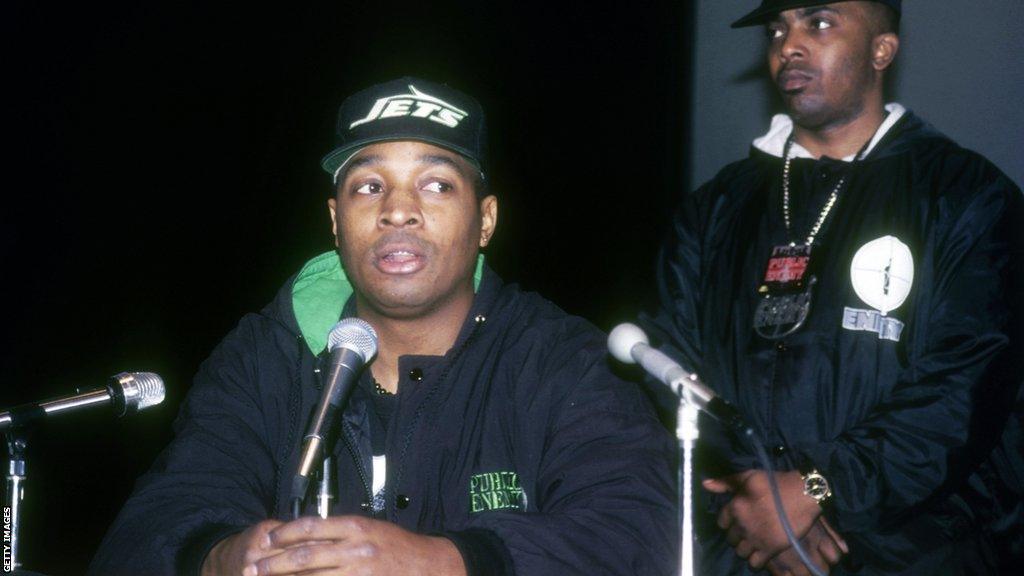
Public Enemy held a press conference to address the controversy caused by their track By the Time I Get to Arizona. It was the only song they performed before walking off stage when playing in support of U2 at Sun Devil Stadium in 1992
Chuck D sings that "the whole state's racist" and although the song was not released as a single, it was still accompanied by a video.
It depicted black paramilitaries assassinating white male politicians after one insisted he would "stay opposed to the holiday as long as I am in office".
"Stevie Wonder and Public Enemy used their music to advocate for a political position," said Dr Boyd.
"Public Enemy were very popular at the time, also controversial, and the interest they were attracting added to fully exposing Arizona for what was going on there. I think it got people talking about the issue who maybe otherwise wouldn't have been paying attention."
Dr Stewart was persuaded to launch a renewed effort with far stronger, more diverse coalition.
Another state-wide vote on incorporating Martin Luther King Jr Day was held in November 1992 and this time it was passed with 62%.
Dr Stewart said: "The problem we had in Arizona was that the majority white people saw the King holiday as a black holiday, and since there were so few blacks here, they said: 'Well, why do we want it then?'
"We had to run a state-wide campaign. Over six years of the coalitions, we had to educate them that the King holiday is an American holiday.
"It's about a man who tried to help America be better, who in the 20th century helped to shape this nation like Abraham Lincoln did in the 19th century and George Washington did in the 18th. Then they got it, and I think the majority of the people voted for the right reason."
When the NFL met in March 1993 to decide the host city of the 1996 Super Bowl, they opted once again for Phoenix.
This time there was no hitch. Ninety-four million US viewers watched the Dallas Cowboys beat the Pittsburgh Steelers to win Super Bowl 30 at a sold-out Sun Devil Stadium.
On the back of that, the Phoenix convention centre was expanded, Arizona got professional baseball and ice hockey teams, and in 2006 the Cardinals finally got their own stadium, which hosted the Super Bowl in 2008 and 2015.
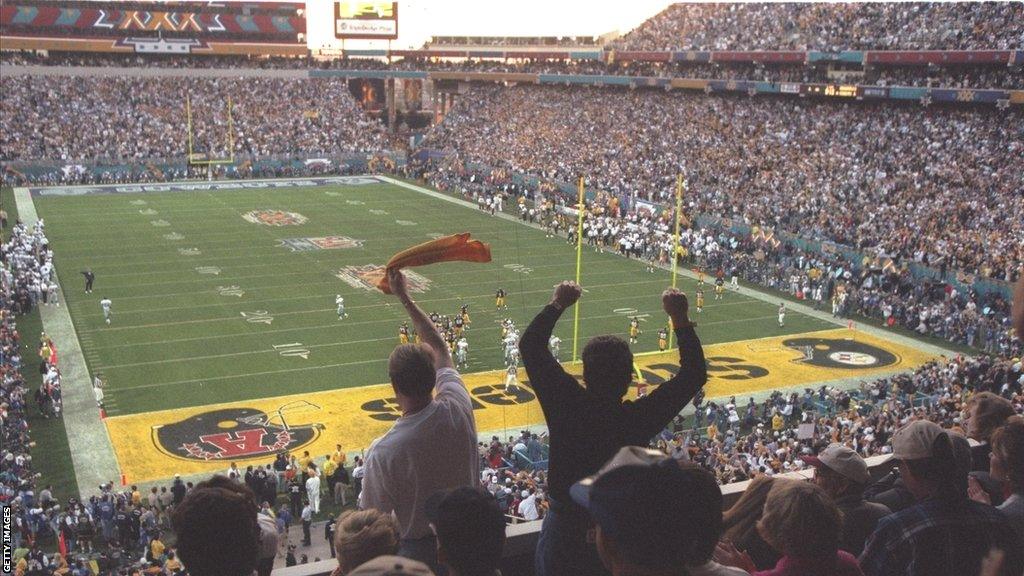
Arizona belatedly held its first Super Bowl in 1996 when the Dallas Cowboys beat the Pittsburgh Steelers at Sun Devil Stadium
In a 1988 track celebrating black excellence, Public Enemy referenced Doug Williams, external becoming the first black quarterback to both start and win a Super Bowl earlier that year.
This year, as the big game returns to the state that refused to acknowledge Martin Luther King Jr Day, it will be the first Super Bowl in which the two starting quarterbacks are black.
Many of the fan and media events are being held at an impressive convention centre in downtown Phoenix, less than a mile from the First Institutional Baptist Church where Dr Stewart preaches.
Today, the neighbourhood around is adorned with murals that celebrate black icons and state that Black History Matters.
And since last year, the street outside his church bears Stewart's name, meaning the pastor and his idol King are two of the few people to have a street named after them in Phoenix.
As the city celebrated this year's Martin Luther King Jr Day, basketball player Brittney Griner, who plays for Phoenix Mercury, surprised fans by joining a march just weeks after she was released from a Russian penal colony.
Looking back, Dr Stewart and Dr Boyd agree that the NFL's decision to strip Arizona of the Super Bowl contributed to progress.
"The legislators and a lot of the people wouldn't listen to reason," said Dr Stewart. "All we wanted to do was join the rest of the nation. But I'm proud we went from being a national embarrassment to a national example."
Dr Boyd added that the NFL had been "forward-thinking and proactive" and feels the statement they made is still very relevant today.
"The NFL has never been perceived to be this left-wing politically progressive organisation, but whatever the reasons, they recognised there was no up-side for them with keeping the Super Bowl in Arizona," he said. "They didn't want to be tainted with that stain.
"The NFL was smart, in the same way Reagan was. You don't want to be the sports league that supported a state that opposed the King holiday. That's not going to age well.
"The NFL is not a social justice organisation, it's an entertainment entity interested in making a profit. But they sent a message in terms of doing business.
"It said that 'if you want to be kind of off by yourself [in your beliefs] then fine, but you're not going to have a Super Bowl'.
"In spite of what the governor and others might have believed, there's a point where you become a pariah. People recognised there's certain lines you can't cross."
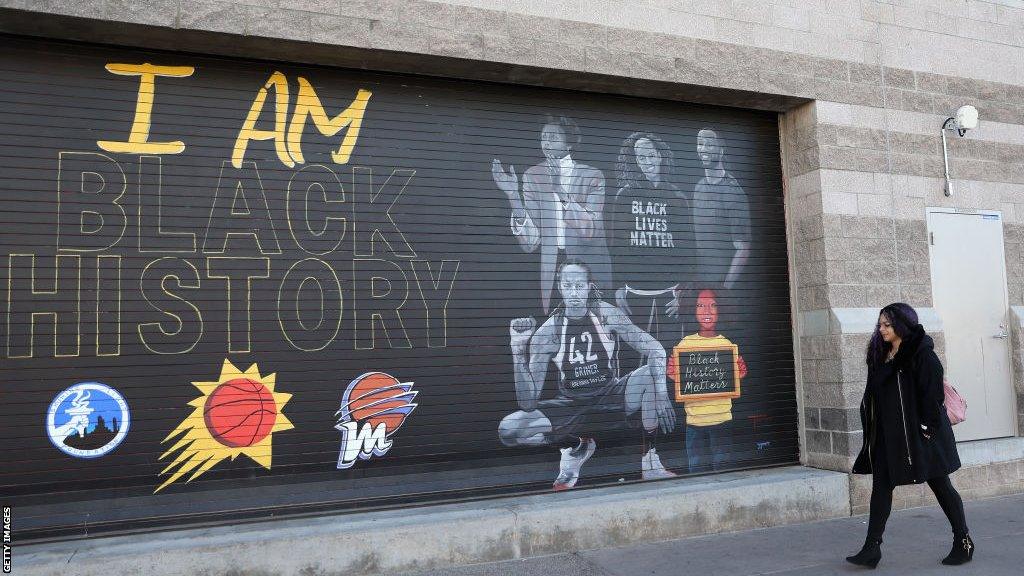
Phoenix is dotted with murals celebrating black history and achievement